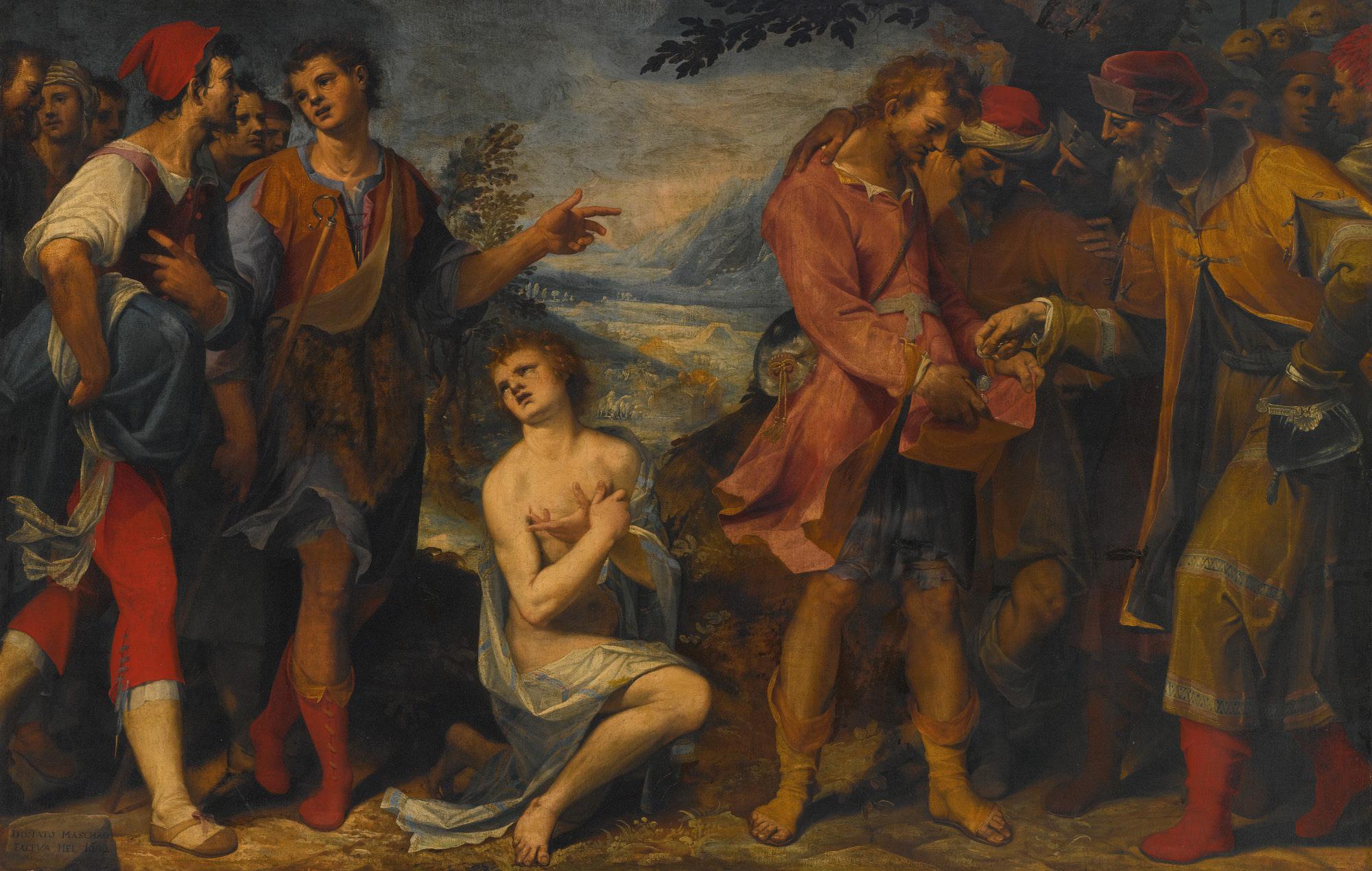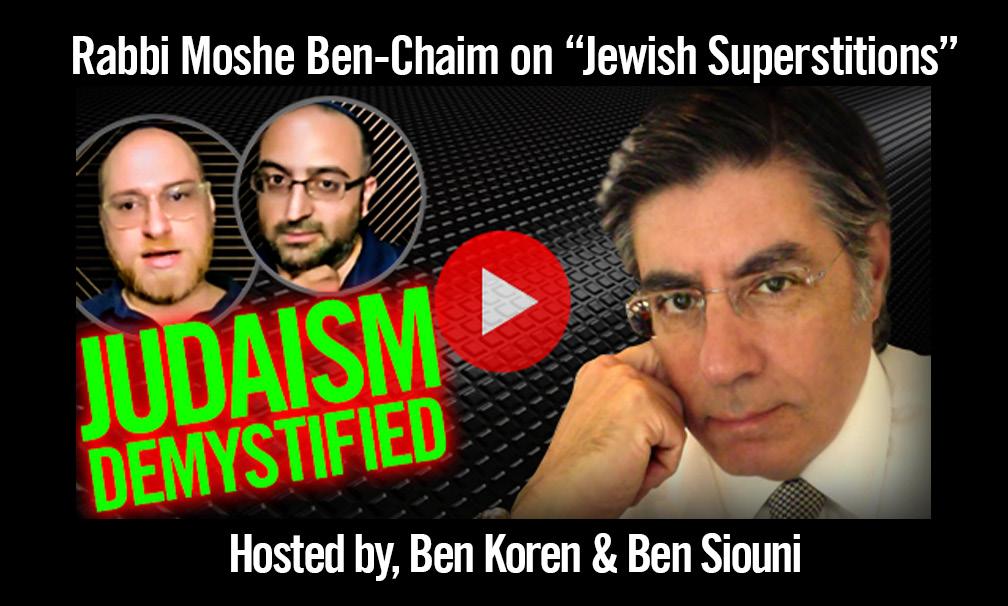
























Channuka teaches that dedication to God and Torah earns His protection, regardless of being severely outnumbered. It teaches that life without God and Torah is not worth living. Don’t think such history can’t happen again. God doesn‘t change. If we are worthy and defend Torah, God will help immediately.




READER: Are Jewish souls eternal? Since the axiom, that from nothing, nothing can be made.
Turk Hill New Jersey, USA
RABBI: A) You cite, "from nothing, nothing can be made," but this is a fallacy. B) I don't understand how
this quote a ects your question on souls. And there’s no di erence between the soul of one born to Jewish or gentile parents. God created Adam and Eve, not Jew and gentile…which refers to one’s obligations, not one’s design. But the design of every human and all souls are identical, be one Jew or gentile.
READER: A) Could you expound why it is a fallacy? B) The axiom,“from nothing, nothing can be made” applies here to souls, only if souls are eternal and not created [meaning souls can’t be created from nothing, they exist only if they are eternal].
RABBI: The idea “from nothing, creation is impossible” is a fallacy, for this misconception is based on what humans experience “after” creation, when natural laws now exist, where all we witness are only things that are created from preexisting matter. But earthly “natural” reality is not the only reality. While it's true that “now” no one cannot create anything without matter…this is true only “after” creation. But prior to creation, such laws did not yet exist. Back then—and even now—God was not constrained by any pre-creation law that restricted Him from creating from nothing. Souls are creations like all else. God created them from nothing. Maimonides explains this error of assuming laws operating now, are the same laws that always existed[1]. Nothing demands this to be true. Maimonides’ example is a boy who never saw a woman, and was told he existed inside the stomach of a female for 9 months. He would look at his current state of requiring air, excretion and other needs, and would reject that idea. So too, we cannot suggest creation from nothingness is impossible, simply due to current natural laws, which too were created from nothing. ■
[1] Guide for the Perplexed, book II chap. XVII
justification, and Jacob subtly conveyed to Esav that any animosity was unjustified. Jacob knew how to di use others.
The lesson derived is one of managing confrontation. Rabbi Chait said Jacob was a chief psychologist, and that the rabbis would review this Torah portion before their political dealings, thereby aligning their minds and emotions with Jacob’s strategies, optimizing their personal interactions and respect for alien authorities. Torah addresses many aspects of life, from commandments which imbue us with metaphysical, philosophical, psychological and moral ideals, to perfected human role models who guide human interplay towards greater harmony, happiness and success. Here, Jacob teaches us the latter in his political dealings. ■


READER: What is the connection between the homiletical explanation, that Jacob kept the 613 mitzvot, with the simple meaning of the verse, that he sojourned as a stranger with Laban? Also, why was it important for Jacob to let Esau know that he kept the 613 mitzvot? And finally, what lesson are we meant to learn from this?
Odupa Abram Mbale City,Uganda
RABBI: I believe the idea that Rabbi Israel Chait mentioned is that Jacob was seeking to di use his brother’s anger for obtaining the birthright. His brother Esav could only justify his anger if Jacob failed to follow his father's philosophy represented by the 613 mitzvos. Of course, as Torah was not yet given, the 613 commands did not yet exist. But the patriarchs’ “observance of Torah (the 613)” mentioned euphemistically by the rabbis refers to the patriarchs’ embodiment of the perfections of the later-given Torah. Esav could care less about 613 mitzvos, but vengeance requires
Reader: Everyone knows that in Judaism, Jews don’t proselytize. We are not like the Christians, “believe in Jesus or else.” Jews always say you don’t have to be Jewish to make it to heaven. But, do you have to be a righteous gentile, a noahide? My question is this: Is it good enough to just be moral? Can an atheist or idolatrous Hindu or a Buddhist, who are moral, make it to heaven even if they do not accept the Noahide commandments or the Torah or even God? And, can someone be a righteous gentile if they keep the 7 laws of Noah only because it makes sense, and not only because a God commanded it.
Shmuel Goldberg New YorkRABBI: It is irrelevant if one feels he leads a moral life, as all morality is based on God’s authority, and thus, he in fact is immoral without God. Heaven is a greater relationship with God. If one denies God, there is no heaven for him. As one of the 7 Noahide laws is denying idolatry and recognizing one God, one is not observing the Noahide system until he accepts God.
READER: So a moral atheist or idolatrous Hindu or Buddhist does not make it to heaven. So you’re saying that besides a handful of Noahides and a minority of religious Jews the rest comprising of atheists and idolaters (di erent religions), in short, most of humanity, won’t make it?
RABBI: The messiah will teach the world and correct their errors. We pray this comes soon so many are saved and Jeremiah’s words are speedily fulfilled when the entire world will say, “We have inherited falsehood from our fathers” (Jeremiah, 16:19). ■

READER: Do you have any articles/advice how to strengthen one’s ego? There are articles of yours that demonstrate its importance in religious life. Do you know how to make it stronger?
A.K.
RABBI: God created ego; it’s essential to our objective of recognizing and loving God. Foremost, ego empowers self-preservation. It helps us defend rights and property. It gives us confidence to speak our minds and helps maintain civilization. We must find satisfaction only when we comply with God’s will in all areas, and not seek ego in matters outside Torah, or for mere self-aggrandizement. This leads to conflicts, and does not contribute to happiness for anyone. Humility avoids many arguments and spares us much headache.
Torah’s role models portray humility and satisfaction with simple lifestyles. They found true happiness in wisdom and in teaching others. There may be cases where an individual had a poor upbringing or was traumatized by individual incidents, and this can deplete one’s ego. In such cases, it is vital to seek counsel in your specific case from wise rabbis and psychologists.

Ego is made healthy when our values are aligned with Torah. We then don’t feel inadequate when having less than others, or when not popular. For when we agree with God’s plan for man, to pursue wisdom and help others, we are satisfied and dignified when doing so, and we are like, Abraham who was satisfied, humble, and generous.
Our society is unfortunately bent on fame, power, lusts and wealth. We must ignore these, and follow what God knows to provide real happiness.
Our self-image—our ego—must be derived from truth and not fantasy, from Torah values and God’s approval, and not from human opinion. ■
What is the purpose of gematria?



Can we truly learn anything from the numerical representation of words?
What is beneath these creative yet apparently simplistic interpretations?
While jointly pursuing semichah and a PhD in mathematics, it seemed natural for Elie Feder to love gematria. However, he was bothered by these compelling questions. That is, until he discovered the purpose of gematria.
Gematria Refigured presents the discoveries that led to the author’s transformation from a gematria skeptic to a gematria lover. It develops a theory which elucidates how the Torah and Chazal use gematria to direct us toward a very specific type of idea. Through its many examples, this work illustrates how gematria can help us uncover novel insights, while providing interesting and clearly formulated perspectives into many mitzvos, themes, and stories in Tanach. Buy on Amazon, click below: bit.ly/Gematria1

Gematria is a polarizing topic. While many love it, many others view it with skepticism.
This week’s Parsha, VaYeishev, tells the story of the sale of Yosef to Egypt. This unseemly matter doesn’t cast the family of Yaakov Avinu (our patriarch) in a positive light. Due to extreme jealousy, the brothers misjudged the nature and goals of Yosef and finally concluded that he had to go. We are disappointed that matters had to reach such a point, but the Torah is absolutely committed to sharing the truth with us in the belief that it is good for us, and we can handle it.
But why did the brothers hate Yosef to the point that they were ready to kill him? There were many factors. At the age of seventeen, Yosef was vain, concerned with his looks and pretty certain of his own capabilities. At the heart of the matter, however, was the close relationship he had with Yaakov and the special benefits which redounded from this.
As a result of Yaakov’s favoritism and Yosef’s behavior, the brothers “could not speak peacefully to him.” But still, this doesn’t seem to explain the very harsh measures that the brothers employed against Yosef. They came very close to killing him and finally settled on selling him, a seventeen-year-old kid, as a slave in a foreign land.
[True, this did not bring Yosef down. That is because the Hand of Providence makes short shrift of human intentions. Hashem continued to care for Yosef in Mitzrayim (Egypt) and provide him with the opportunities to reach the pinnacles of power. Yosef’s indomitable spirit enabled him to persevere and take advantage of the chances that came his way.]
How are we to make sense of the behavior of Yosef’s brothers?
After all, they were great men who went on to become leaders of the Tribes of Israel. Is it possible to imagine that they would destroy a brother because their father had favored him with a special coat? Of course not!
Unfortunately, Yosef was a dreamer of (prophetic) dreams. The dreams which subsequently came to pass years later in Egypt depicted Yosef as the practical and spiritual leader of the family.
At that point in time, the brothers did not regard Yosef as a valid
prophet and attributed his dreams to his megalomaniacal fantasies. To them, this signified that Yosef intended to seize power and subject the family to his economic and religious dominance. They came to the conclusion that they would have to eliminate him from the picture by rendering him a slave in a foreign land.

But where was Yaakov Avinu in all this? How could matters reach such a point without him sitting down with both sides and seeking to e ectuate reconciliation? In fact, it was Yaakov himself who sent forth Yosef to check on his brothers, who were grazing the sheep in Shechem, on that fateful day. And Yosef made no objection to placing himself in the clutches of his erstwhile enemies, even though he didn’t have to obey his father when doing so posed a risk to his life.
But we must conclude that both Yosef and Yaakov were blinded to the true dimensions of the brother’s animosity. Neither one of them sensed the real extent of the peril that Yosef was in. There is a natural human inclination to downplay the extent of dangers one is reluctant to face.
This tendency has a icted us and produced disasters throughout our history. In introducing the story of Kamtza and Bar Kamtza which led to the Destruction of the Temple and Exile, Rabbi Yochanan said, “Fortunate is the man that always is “frightened” and he that hardens his heart will come to harm” (Gittin 55b).
We are currently experiencing an alarming resurgence of world-wide anti-Semitism. Our history teaches us that this is something we cannot brush o , downplay or take lightly. We must be vigilant in our response to this matter and never fall prey to the tendency to say, as they often do in Israel, “Yistader” (It will all work out). Let’s certainly hope it that does, but let us not take our eyes o the ball.
Shabbat Shalom.■







Judaism cites three severe sins, for which one must die and never violate: idolatry, adultery, and murder. If one was coerced at gunpoint to violate any of these three, he must take the bullet and not violate. What is their common severity?
When we say one must die instead of violating a certain sin, it means that one’s death is preferable to continued life with such a violation. Such a violation would render the person's life worthless. What then is the worthlessness in each case?
If one were to commit idolatry, he demonstrates a bankrupt soul: his intelligence does not function on an acceptable level. As his concept of God is distorted—as his primary goal is lost—his life is worthless. This is a sin of intelligence.
If one would commit adultery, it displays his lusts have no bounds, and he would destroy a family for a momentary gratification. His attachment to lusts once again render his life worthless, as he chooses sensuality over wisdom. This is a sin of the emotions. These two sins comprise man’s intellect and lusts.

But murder relates not to man’s intellect or instincts, but to his psychological world, a powerful component being one's ego. Murder is an ego expression, the most violent display of intolerance towards one whom he feels wronged him. The victim is intolerable in the murderer’s mind. The victim crossed the threshold of personal insult. One murders to eliminate an intolerable personality. The murderer’s emotions must override another’s life. The murderer prioritizes his psychological world view over reality. It is only in his mind that the murderer seeks a balance of justice. When one prioritizes his inner world over what is actual, he has expressed the same corruption as idolatry where one manufactures a new “reality” in his fantasy. But God created man not to live in his emotional world, but in external reality. Prioritizing our emotional world over God’s will that we live in reality, one again forfeits his purpose. His existence is worthless.

When a life is rendered worthless by a severe sin, one must not violate that sin under any condition. One must choose death over sinning. Thus, these three sins refer to three cases of a life rendered worthless. One could render his own life worthless through either distorted ideas (idolatry), through overvaluing sensual gratification (adultery), or one can unleash his ego and murder another.
Our lives lose all value when we fail to meet a certain threshold of intellectual truth through idolatry, or if we should cave to a certain threshold of lust through adultery. Our lives also lose all value if we prioritize our psychological world by unjustly terminating another life. ■
Genesis 22:2 says that it was told to Abraham that there was new lineage born to his family. Why was this communication included in Torah? Rashi (Ibid.) says Abraham initially intended to seek a bride for Isaac from his friends Aner, Eshkol and Mamre. Rashi also says, “God told Abraham that Isaac’s mate Rebecca was born.” But this part of Rashi can’t be literal, as we clearly read in the verses, Abraham was not told that Rebecca was the intended bride for Isaac. Had this been so, he would not have had Eliezer seek someone “in general,” but he would have told Eliezer to retrieve Rebecca by name.
As we see that Abraham does not approach Aner, Eshkol or Mamre, the news that Abraham’s family had new lineage was needed for Abraham to avoid seeking a daughter in law from his 3
friends, to find a more choice bride for Isaac from his own family. That was how Abraham responded. Abraham would have been correct to go to his three friends for a daughter-in-law. But he now changed course as he determined his own family was a better choice. Perhaps this is also why Abraham desired a son, has he knew his teachings would be better received by the world when a son transmits his father’s lessons, as opposed to an unrelated student. Now, Abraham again preferred family over others to marry Isaac.
This portion of Torah is teaching that even man's greatest intentions cannot penetrate the depths of God's plan, and therefore God directed Abraham to avoid a lesser caliber person as a daughter-in-law. But just as God did not tell Rebecca years later how to formulate a plan to secure the birthright for Jacob, but only made Esav hairy, and showed her Jacob clutching Esav’s heel, God also did not give the specifics to Abraham here and allowed him to use his mind. God always provides the essential elements to the chocham which are necessary for him or her to use intelligence to benefit the world through their own cunning. God helps righteous people who seek Him out, to engage their minds in all areas. God provided only clues to Rebecca to secure Jacob as the fit heir, and God gave subtle direction to Abraham too.
This is God’s way: He helps the righteous, the wise, and prophets engage their minds in all areas, and He does not spell-out the steps. ■

